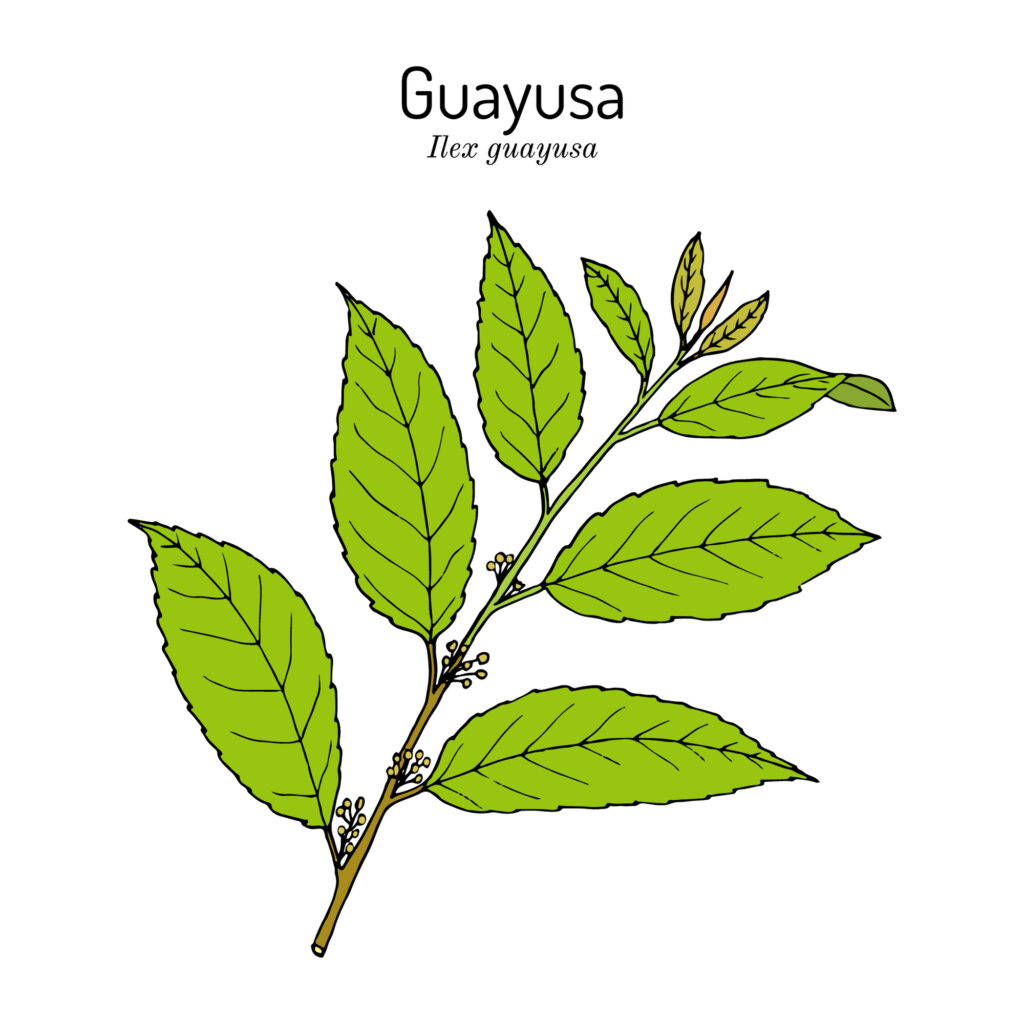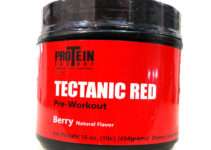Note guayusa is now in my Force 400 Pre workout.
If you are a reader of my website you’ll know that I am not a fan of caffeine for the use of muscle building. I never recommend it as a pre workout supplement especially. Our Tectanic Red is 1,000 times better. However, I am understanding to the fact that many people like caffeine and use it for their pre-workout supplementation needs. One purpose of my website is to supply the best and most truthful information about supplements on the internet. That being said, I found an ingredient that I like much better than caffeine called guayusa. And in my opinion, it is a much better alternative to caffeine with more benefits as well.
What is Guayusa
Guayusa (Ilex Guayusa) is a native tree from the Amazonian Rainforest of Peru, Bolivia, Colombia, and mostly Ecuador. It is one of the three known caffeinated holly trees and it has become very famous due to their special chemical components found in their leaves that convert it not only a superfood that provides energy but also as a medicinal plant due to its beneficial properties like antibacterial, antioxidant and others healthy effects.

History
This plant has been a part of human history as it has been used for ritual purposes and as a beverage. Its consumption has been documented in traditional societies of the Northern Andean region, from Colombia to Peru. Also, archaeological findings of guayusa leaves have been identified in several shamanic tombs dating as early as 500 BCE.
The leaves of guayusa tree are dried and brewed like a “tea” to get a stimulating drink with beneficial effects on health, in fact in some indigenous communities it is known as “night watchman”, since it helps to keep them awake. It is an infusion (since is not actually related to green or black tea) that when is brewed, it has about as much caffeine as coffee and twice the antioxidants of green tea.
Moreover, in these populations, this infusion is traditionally used to reduce inflammation of the prostate, as a purgative of the digestive system and as a flu remedy. Given the high amount of antioxidants in it, it is also used to prevent aging and is even used as an insect repellent and snake bites. Besides, women take guayusa infusion as a remedy against infertility and wound healing.
In the Ecuadorian Amazon, infusion of guayusa is not only used as a beverage associated with medicinal properties but also as a ceremonial plant, for them the guayusa has a sacred meaning. They actually believe that it was a divine being converted into this marvelous tree. Referring to this matter, they say that “before becoming a sacred plant, it was a divine being that inspired courage, and raised the spirit for the realization of companies. Likewise, it stimulated making smart and hard decisions and conferring the joy to live and succeed”.
Among the indigenous people of the Ecuadorian Amazon, it is also said that it is a drink that is consumed at dawn, while the elderly communicate their traditional knowledge to the young people and tell them their myths of origin and other stories; this practice helped to reinforce the sense of oneness in the community, giving people an occasion to come together and share stories. As well, as a ceremonial plant, in this indigenous population it is most of the time consumed before, during, or after the consumption of the hallucinogenic brew of ayahuasca to “wipe out its bitter taste” and “prevent hangover”.
Guayusa Benefits
At the present time, due to the high demands of today’s world, men and women are always looking for drinks and food that help them feel more energetic in order to meet their day-to-day goals; they want to have enough energy but without harming their health. That is why most people are currently looking for drinks and alternative substances to coffee, which can give them, the same levels of energy and also could give a beneficial plus to their health without some of the most common side effects of coffee (palpitations, insomnia, nervousness, among others) But why guayusa?
First and foremost, it is because of the high content of antioxidants found in their leaves, 50% more than green tea, and much more than other superfoods (more than acai berries, goji berries, blackberries, blueberries, and even kale for example). Antioxidants, found in guayusa leaves, are substances that can prevent or slow damage to cells caused by free radicals (which are unstable atoms that can damage cells), that in high amounts in our body has been linked to the development of many diseases such as heart disease, cancer, arthritis, stroke, immune deficiency, Parkinson’s disease, and other inflammatory conditions.
This is why guayusa infusion it is more than an stimulating drink since it has anti-diabetic, anti-cancer, anti-inflammatory, antibacterial, neuro and cardioprotective properties.
Moreover, the antioxidants found in guayusa leaves are mainly flavonoids (a type of polyphenols) and saponins. But the infusion not only has antioxidants, but another health related substances like methylxanthines caffeine, theobromine as well as chlorogenic acids. It is also rich in vitamins and minerals such as magnesium, calcium, zinc, potassium, and vitamins C and D, additionally contains seventeen amino acids.
Thanks to this unique composition, guayusa infusion has several benefits on health, in fact studies have shown that can lower the risk of cardiovascular disease and cancers, reduce body weight and plasma levels of free triglycerides (TG), cholesterol, and low-density lipoprotein cholesterol, it also has shown an amazing antiaging effects.
However, at the moment, it is important to take into account that studies investigating the health properties of guayusa are limited and almost no studies have been performed on humans. Nevertheless, given the benefits manifested in scientific studies, here are some of the most important and consistent benefits found among them:
Anti- Cancer effect
One of the components of guayusa plant is ursolic acid (UA) and it is known to be the active constituent of this plant. The proportion of this compound found in guayusa is considered pretty unusual for dietary plants. The great thing about ursolic acid is that it has anti-tumor effects and is an effective substance for cancer prevention and therapy.
It is thought that ursolic acid can potentially have the ability to suppress many key steps of tumor initiation, progression and spread, since it could inhibit the appearance of metastasis in cancer patients.
Likewise, the most common polyphenols found in guayusa “tea” are caffeoylquinic acids (CGA), which have been probed to induce cell death of cancer cells and suppress generalized inflammation caused in cancer patients.
Weight loss and obesity treatment
These CGA (also known as chlorogenic acids), are a trend at the moment given that it helps in weight loss and for its benefits to the cardiovascular health.
CGA helps to reduce body weight via many mechanisms such as regulating glycaemia by the inhibition of glucose absorption and also reducing net hepatic glucose output. By regulating the amount of sugar contained in blood, it regulates the insulin activity, helping to maintain glycaemia in balance and preventing insulin peaks (which are related with metabolic diseases such as insulin resistance, obesity and diabetes Mellitus). Also, it is suggested that CGA may attenuate genes involves in the creation of fat cells and the inflammation in fat tissue.

Another mechanism related to why guayusa may help reduce body weigth is by causing the metabolism of body fat. This happens thanks to its content in caffeine, since this substance stimulates catecholamines which produce lipolysis (breaking of the fat tissue).
Additionally, some scientific studies has also shown a benefit of guayusa infusion consumption in the maintaining of a healthy weight and treatment of obesity, since it activates a receptor called TGR5 that has been associated with the regulation of glucose homeostasis, lipid metabolism, regulation of basal metabolism and energy expenditure.
Diabetes Mellitus and insulin resistant adjuvant treatment
The aim in diabetes Mellitus and insulin resistant treatment is to accomplish the balance of glycaemia trough the intervention of insulin secretion and sensibility. Taking this into account, guayusa leaves have an important substance that helps in this goal, this substance is ursolic acid (UA) mentioned before as a possible adjuvant treatment for cancer.
That is why UA, besides its anti-tumor effect used for cancer patients, it is also known to be a potential anti-diabetic agent given its possible use as an insulin resistance and diabetes therapy.
Also, studies suggest that UA helps in the regulation of glucose homeostasis through its ability to promote insulin secretion. Another mechanism is its insulinomimetic effect, which means that this substance works as insulin and causes the stabilization of glycaemia. Another potential use of it, is as an adjuvant treatment of one of diabetes Mellitus complications which is nephropathy or damage in patient’s kidneys. In this matter UA could be used as a protective agent to counter renal injury thanks to its antioxidant and anti-inflammatory effects.
It is important to say, that besides the benefits mentioned in human health, it is also beneficial for the environment and local communities; as it is typically grown on small family farms and cultivated according to environmentally friendly methods. This is why it is thought that if its commercialization increases, it may support the sustainability of South America Rainforest in addition to help indigenous communities to thrive.
Now that it is known all the great benefits of guayusa infusion ingesting, it is fair to ask: what are the possible side effects of its consumption?
Side Effects
As explained before guayusa infusion is used as a stimulant beverage but it is an unusual one, since it helps maintain wakefulness with a very smooth and light stimulation. Thanks to its content in caffeine it gives people energy; but it also has l-theanine and theobromine, substances found also in cocoa.
These both substances help to boost concentration and focus of mind whilst giving an uplifting feeling. This is why guayusa is known to maintain wakefulness as well as induce a pleasant tranquility, since the effects of caffeine would be moderated by the effects of theanine and theobromine.
Also a study that compared the effects of green bean coffee and guayusa leaves on neurotransmitter such as adrenaline, explain that guayusa leaves have a less effect on this neurotransmitter than green bean coffee. Adrenaline is a substance that causes the probable side effects of caffeine such as feeling nervous, anxious, or fearful, having palpitations, feeling nausea or dizziness. The results of this study found a preliminary evidence that the guayusa leaf extract caffeine source differs from the green bean coffee caffeine source regarding to adrenaline, which may imply a reduced chance of adrenaline‐related side effects in guayusa consumption.
Nevertheless, it is important to keep in mind that overconsumption on any type of high-caffeine product can have a negative impact on health and wellbeing. As said before, theanine and theobromine could reduce the adrenaline‐related side effects of caffeine, but it still has a significant dose of it, so its exaggerated consumption could cause these side effects.
This is why pregnant and nursing women should not consume this beverage (since it is not recommended for them the ingestion of caffeine, even if no genetic toxicity has been found at the moment after drinking guayusa infusion). Also, it is important to mention that certain drugs and supplements may interact with caffeine-rich substances, such as guayusa.
Equally it is recommended that patients who suffer from any cardiovascular disease, psychiatric or neurological condition consult first with their physician before consuming this plant.
Therefore, at the moment, there is no evidence of any concern to consumers of Guayusa infusion or beverages formulated with it, if the total amount of caffeine consumption does not exceed 400 mg.
Guayusa vs Yerba Mate
Another caffeinated beverage related to guayusa, and more popular than it, is yerba mate. They both come from the same plant (holly tree), but they are not the same species. The yerba mate scientific plant name is ilex paraguariensis, while guayusa has an easier one: ilex guayusa.
Although they both come from the same plant, and regardless of most people think that they are exactly the same, they have some differences between them. And it is not a matter of which one is better than the other, this is an opinion that the consumer will make after knowing some facts about these plants, and taste them! Let´s talk more about this.
Guayusa, as explained before, grows in the northern parts of South America. Specifically, the Amazon Rainforest of Peru, Bolivia, Colombia and mostly Ecuador (generally consumed in this country). While, yerba mate is grown and consumed in the southern parts of South America such as Argentina, Uruguay, Paraguay and Brazil.
The drying process, of the leaves of these trees, is another difference between guayusa and yerba mate. For example to dry guayusas’s leaves, companies use natural gas-fired ovens. In contrast, to dry yerba mate, they use fire from burning wood. This last fact may be something some consumers may consider while deciding which one they like the most, since the process used in yerba mate could increase PAH (polycyclic aromatic hydrocarbon) content; and some studies have shown that this substance could causes cancer. Thankfully companies have started making unsmoked yerba mate to reduce the levels of PAHs, so users have the choice to pick the ones dried under this healthier process.
Also, although they cause almost the same benefits and the same effect of energy with a sensation of calmness, their chemical compounds are not exactly the same. Even if they both have caffeine (yerba mate more than guayusa) and theobromine, there are two substances that differ between yerba mate and guayusa: on one hand guayusa have l-theanine (as mentioned before) and on the other, yerba mate has theophylline, which is a substance found also in tea. Theophylline is used to prevent and treat respiratory illnesses such as asthma, chronic bronchitis, emphysema, and other lung diseases. So, this difference makes the consumer experience diverse after the consumption of each of them. Actually, it is said that guayasa is more relaxing than yerba mate.
The way that they are prepared is another difference since extracts from the two plants are prepared in different manners: guayusa is consumed as a brewed tea, while yerba mate is prepared as typically a beverage product, and sometimes from which it is sucked with a special straw called “bombilla”. Regarding the taste, they both have a similar one; although people refer that yerba mate has a stronger and bitter taste
| Guayusa | Yerba Mate | |
| Scientific plant name | Ilex guayusa | Ilex paraguariensis |
| Geography | Peru, Bolivia, Colombia and Ecuador. | Argentina, Uruguay, Paraguay and Brazil. |
| Drying process | Natural gas-fired ovens | Fire from burning wood |
| Chemical composition | Caffeine Theobromine L-theanine | Caffeine Theophylline Theobromine |
| Taste | Sweeter | Stronger and bitter |
Differences between guayusa and yerba mate.
So, if you are ready to have your cup of guayusa tea infusion, you must know that you are probably going to find it in loose-leaf form, rather than in tea bags, and that the leaves should be stored in an airtight container until used.
To brew, experts suggest that you bring fresh, cold water to a boil. Then pour one cup of boiled water over about two grams of leaves and steep for up to seven minutes depending on how dark it is wanted. One unusual difference with guayusa is that it’s pretty much impossible to over brew it. Enjoy!
Where To Buy Guayusa Products
I have done some research and the best quality guayusa product is called Amatea. Amatea is a branded guayusa powder. It is approximately 20% caffeine. One cannot buy it by itself, only supplement companies can buy it and use it as an ingredient in their products. Then the consumer can purchase it. Unfortunately at this time, I cannot find any Amatea guayusa products. If one if released for consumer purchase I will update this article.
Using Guayusa For Pre Workout Supplementation.
I recommend using anywhere from 1 to 1.5 grams of Amatea guayusa pre workout or for simple energy support. I have seen marketing from companies selling guayusa and they claim it does not cause jitters. My personal experience I can firmly state that when I used Amatea powder at a rate of 1.5 grams I felt like I just drank about 3 cups of coffee. Keep in mind, as I mentioned above, I do not recommend caffeine for bodybuidling or athletic purposes. Caffeine released cortisol in the body, which creates a catabolic condition. (muscle wasting and fat gaining). Instead try to use guayusa extracts if you feel tired and need to wake up. For example if you need to drive, study for something important, meet a deadline, or stay up late.
In conclusion, guayusa without a doubt is a very effective energy ingredient. Using 1.5 grams of the powder will give one the same effect as a powerful pre workout supplement. Use it instead of caffeine because it has more health benefits, and in my opinion is safer with less side effects.
References
Gomes, A. et al. The mechanism of action of ursolic acid as insulin secretagogue and insulin-mimetic is mediated by cross-talk between calcium and kinases to regulate glucose balance, Biochimica et Biophysica Acta (BBA) – General Subjects, Volume 1850, Issue 1, 2015, Pages 51-61, ISSN 0304-4165, https://doi.org/10.1016/j.bbagen.2014.10.001.
Gan RY, Zhang D, Wang M, Corke H. Health Benefits of Bioactive Compounds from the Genus Ilex, a Source of Traditional Caffeinated Beverages. Nutrients. 2018;10(11):1682. Published 2018 Nov 5. doi:10.3390/nu10111682
G. Chianese, S.D. Golin-Pacheco, O. Taglialatela-Scafati, J.A. Collado, E. Munoz, G. Appendino, F. Pollastro, Bioactive triterpenoids from the caffeine-rich plants guayusa and maté, Food Research International, Volume 115, 2019, Pages 504-510, ISSN 0963-9969, https://doi.org/10.1016/j.foodres.2018.10.005.
Jasmine M. Tunnicliffe, Theresa Cowan, Jane Shearer, Chapter 86 – Chlorogenic Acid in Whole Body and Tissue-Specific Glucose Regulation, Editor(s): Victor R. Preedy, Coffee in Health and Disease Prevention, Academic Press, 2015, Pages 777-785, ISBN 9780124095175, https://doi.org/10.1016/B978-0-12-409517-5.00086-3.
Kapp, R. W., Mendes, O., Roy, S., McQuate, R. S., & Kraska, R. (2016). General and Genetic Toxicology of Guayusa Concentrate (Ilex guayusa). International Journal of Toxicology, 35(2), 222–242. https://doi.org/10.1177/1091581815625594
Krauss, T. Ness, B. Energizing agroforestry: Ilex guayusa as an additional commodity to diversify Amazonian agroforestry systems. International Journal of Biodiversity Science, Ecosystem Services & Management. Volume 13, 2017 – Issue 1. https://doi.org/10.1080/21513732.2017.1303646
Krieger, D. R., Kalman, D. S., Feldman, S., Arnillas, L., Goldberg, D., Gisbert, O., & Nader, S. (2016). The Safety, Pharmacokinetics, and Nervous System Effects of Two Natural Sources of Caffeine in Healthy Adult Males. Clinical and translational science, 9(5), 246–251. https://doi.org/10.1111/cts.12403
Muthu K. Shanmugam , Xiaoyun Dai , Alan Prem Kumar, Benny K.H. Tan, Gautam Sethi, Anupam Bishayee. Ursolic acid in cancer prevention and treatment: Molecular targets, pharmacokinetics and clinical studies Biochemical Pharmacology 5 (2013) 1579-157 http://dx.doi.org/10.1016/j.bcp.2013.03.006
Tajik, Narges. Tajik, Mahboubeh. Mack, Isabelle. Enck, Paul. The potential effects of chlorogenic acid, the main phenolic components in coffee, on health: a comprehensive review of the literature. European journal of nutrition (2017). DOI: 10.1007/s00394-017-1379-1
Xu HL, Wang XT, Cheng Y, et al. Ursolic acid improves diabetic nephropathy via suppression of oxidative stress and inflammation in streptozotocin-induced rats. Biomed Pharmacother. 2018;105:915-921. doi:10.1016/j.biopha.2018.06.055
https://connectamericas.com/company/agroindustria-healthy-amazon
https://www.medicalnewstoday.com/articles/301506
http://www.medicinehunter.com/guayusa
https://www.yerbamatelab.com/guayusa-vs-yerba-mate/
Alex Rogers is a supplement manufacturing expert. He has been formulating, consulting, & manufacturing dietary supplements since 1998. Alex invented protein customization in 1998 & was the first company to allow consumers to create their own protein blends. He helped create the first supplement to contain natural follistatin, invented whey protein with egg lecithin, & recently imported the world’s first 100% hydrolyzed whey.









